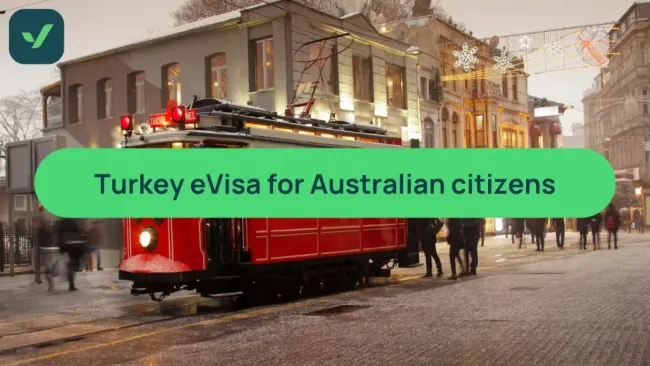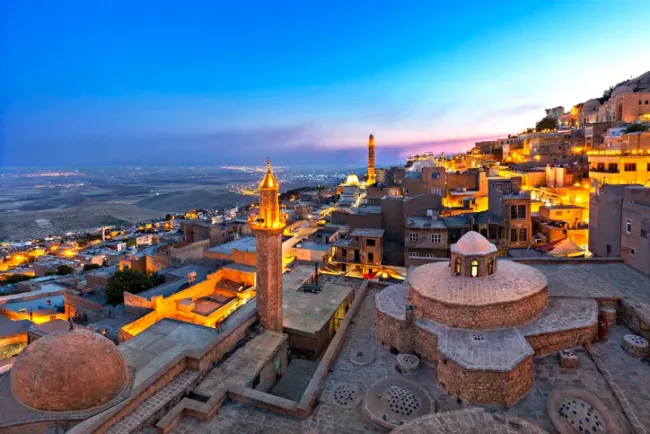
Turkey
Welcome to Turkey
Traveling to Turkey? You may need a visa – find out if you do, which type, and how to apply so you can get the paperwork out of the way and focus on your trip.

What’s the Turkey eVisa and who’s it for?
Who’s the Turkey eVisa for?
Travelers from Antigua and Barbuda, Armenia, Australia, Bahamas, Bahrain, Barbados, the United Kingdom, China, Cyprus, Dominica, Dominican Republic, East Timor, Fiji, Grenada, Haiti, Jamaica, Maldives, Mauritius, Mexico, Oman, Saint Lucia, Saint Vincent and the Grenadines, Saudi Arabia, South Africa, Suriname, Taiwan, United Arab Emirates.
Who’s not eligible for a Turkey eVisa?
- Those who are visa-exempt or need to apply at the embassy for a Turkish visa.
What’s the purpose of the Turkey eVisa? This Tourist eVisa is meant for tourism or business purposes.
How long can you stay with a Turkey eVisa?
The allowed duration of your stay in Turkey is determined by your nationality and may vary from 30 to 90 days within every 180 days. Depending on your citizenship, you may be granted either a single-entry or multiple-entry visa.
What’s the Turkey Embassy Visa and who’s it for?
Who’s the Turkey Embassy Visa for? This visa is designed for travelers who are not eligible for visa-free access or the eVisa.
What’s the purpose of the Turkey Embassy Visa? This visa is meant for longer stays or nationalities and purposes not covered by the eVisa.
How long can you stay with a Turkey Embassy Visa? The validity of the Embassy Visa is determined based on your nationality.
At iVisa, we currently don’t currently offer the Turkey Embassy Visa, but you can find out more on how to apply in this blog from our expert travel reporter.
What are the Turkish long-term visa options?

Turkey offers several long-term visa options for various purposes, such as employment, study, business, and residence. Here are some common long-term visas:
-
Student - Education Visa: The Student–Education Visa for Turkey encompasses various academic and educational pursuits, each tailored to specific learning experiences, such as internships, language courses, or studying at a Turkish university.
-
Working Visa: The Working Visa for Turkey is designed to cater to a broad spectrum of professional activities, each aligning with specific employment needs, such as those wanting to work in the country, teachers, artists, athletes, journalists, repairmen, and more.
-
Official Visa: The Official Visa for Turkey is specifically designed for individuals on official government or diplomatic duties.
-
Other visas - Special categories for unique needs: The Other visas category for Turkey includes a range of specialized visas, each designed for specific purposes beyond tourism or standard employment, such as:
-
Archaeological excavation and exploration.
-
Documentary producing.
-
Tour operator representative.
-
Medical treatment.
-
Individuals accompanying family members traveling to Turkey for various reasons.
-
Family unification.
-
Freight transport and logistics operations.
-
Seafarers and maritime crew members working on vessels in Turkish waters.
Staying healthy in Turkey: Here’s what you need to know
Turkey is known for its high-quality healthcare system, which is a mix of public and private healthcare facilities. Here's what travelers should know.
Make sure to stay updated on routine vaccines
-
Consider vaccines for diseases like Hepatitis A, Typhoid, and rabies.
-
Keep updated with Turkey's COVID-19 requirements, such as quarantine, testing, or vaccine certificates, through your airline or the Turkish government website.
Medical facilities
-
In urban areas, private hospitals and specialized centers usually offer high-quality healthcare services. These are also the ones mostly used for medical tourism.
-
Turkey's healthcare system is highly regarded, especially in major cities like Istanbul, Ankara, and Izmir.
-
Turkey is a popular destination for medical tourism, known for specialties like cosmetic surgery, dental procedures, and hair transplants. Hospitals catering to medical tourists often offer packages that include treatment, accommodation, and sometimes transport.
-
Pharmacies are abundant, and pharmacists typically provide advice and sell over-the-counter medication.
Health insurance
We’d always recommend taking out health insurance before you travel anywhere from any destination.
All the major cities in Turkey will have private medical care, but it’s expensive. You should choose travel insurance with high medical limits.
Contact your insurance provider before traveling to make sure you have the right level of coverage.
Other things to consider:
-
Trip cancellation, delay, and interruption benefits.
-
Medical expenses and medical evacuation benefits.
-
Baggage coverage.
Things to be aware of when visiting Turkey
Keep an extra eye on the following to keep healthy and safe during your trip to Turkey:
1. Food and water safety: Issues like travelers' diarrhea are common. Stick to bottled or boiled water and eat well-cooked food from reputable sources.
2. Heat exposure: In summer, especially in the Mediterranean and Aegean regions, temperatures can soar, posing risks of heatstroke and dehydration.
3. Animal hazards: Rabies is common in Turkey, especially in stray dogs. Consider getting a rabies shot before departure, and if bitten, seek medical attention immediately for post-exposure prophylaxis.
Medication for personal use
Follow these tips to bring over-the-counter medicines into Turkey:
-
Declare all medications: Report all medication for personal use to customs authorities.
-
Original packaging: Always keep medicines in their original containers and in transparent bags in your hand luggage.
-
Prescription or doctor's letter: Present the medical prescription issued by your doctor or other competent authority, in English.
-
Check for restrictions: Call Turkey's embassy to verify that all of your prescription(s) are legal to bring with you.
-
Quantity aligned with itinerary: Bring only a reasonable quantity that aligns with your stay duration to avoid complications.

Turkey Airport guides
Know which airport you’re flying into? Check out these airport guides created by our travel reporters, with tried-and-tested tips for a smooth arrival and departure:

 Australia ETA Online
Australia ETA Online
 United Kingdom ETA
United Kingdom ETA
 India Tourist eVisa
India Tourist eVisa
 Canada ETA Visa
Canada ETA Visa
 Turkey eVisa
Turkey eVisa
 Egypt eVisa
Egypt eVisa
 Singapore SG Arrival Card
Singapore SG Arrival Card
 Indonesia eVoa Visa
Indonesia eVoa Visa
 Aruba ED Card
Aruba ED Card


